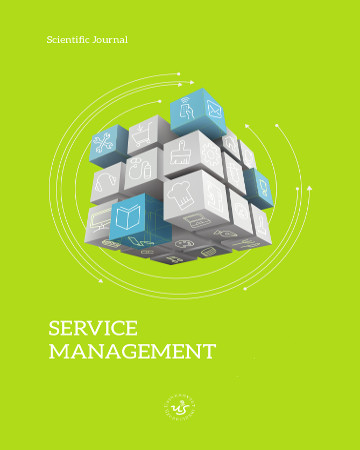
ISSN: 2450-8535
eISSN: 2353-2858
OAI
DOI: 10.18276/ejsm.2017.22-03


Issue archive /
Vol. 22, 2/2017
Theoretical components of intra-industry service development strategy
| Authors: |
Marek
Gnusowski
Poznan University of Economics and Business Anatoliy G. Goncharuk International Humanitarian University Elżbieta Skąpska Bialystok University of Technology Olga Domakur Bielarusian State Academy of Communications in Minsk |
| Keywords: | service sector development strategy economic growth methodology of development |
| Data publikacji całości: | 2017 |
| Page range: | 9 (21-29) |
| Klasyfikacja JEL: | A10 B40 O11 O12 |
Additional information
.
Abstract
Presently, the globalization in trade and in capital markets forced service organizations to extend the range of service functions to meet globally accepted standards in a single economic system. However, not all service companies are the same. Globalization has different implications for different types of services and is affected by the nature of the process involved in creating and delivering a given service. The aim of this paper is to define strategies and enduring patterns of action for service sector entities such as: a set of reliable rules, means and reactions as well as to define new methods of performance through analysis and logical conclusions that arise from the laws and dependence between economic values. All the factors have significance in terms of the growth in services thus in the growth of the whole economy in general.
Download file
Article file
Bibliography
| 1. | Aboal, Bravo-Ortega, Crespi (2015). Innovation in the Services Sector. Emerging Markets Finance & Trade, 51 (3). |
| 2. | Agenda. Production and Operations management, 12 (2), 145-64. |
| 3. | Day, G.S., Wensley, R. (1988). Assessing advantage: a framework for diagnosing competitive superiority. Journal of Marketing, 52 (2), 1-21. |
| 4. | Dienstleistungen in der Weltwirtschaft. Die Bedutung der Einbeziehung von Dienstleistungen in das GATT für die Dritte Welt, Eine Studie des Starnberger Instituts, Verlag Dienste in Übersee, Hamburg (1988). |
| 5. | Galbraith, J.R. (1973). Designing Complex Organizations. Reading. MA: Addison-Wesley. |
| 6. | Goldstein, S.M., Johnston, R., Duffy, J. and Rao, J. (2002), “The service concept: the missing link in service design research?”, Journal of Operations Management, 20 (2), 121-34. |
| 7. | Hinterhuber, H. H. (1986). Struktur und dynamik der strategischen Unternehmungsfuhrung. In Strategische Unternehmensplanung. Heidelberg: Physical. |
| 8. | International Monetury Fund (IMF). Retrieved from http://www.inf.org. |
| 9. | Janger, J., Schubert, T., Abdries, P, Rammer, Ch., Hoskens, M. (2017). The EU 2020 innovation indicator: A step forward in measuring innovation outputs and outcomes? Research Policy, 46 (1), 30-42. |
| 10. | Keih, M., Demirkan and Goul, M. (2013). Journal of Management Information Systems, July |
| 11. | Kopeikina, L. (2011). Same dobre decyzje. Poznań: Rebis. |
| 12. | Langhammer, R.J. (2007). Service Trade Liberalization as a Handmaiden of Competitiveness in Manufacturing: An industrialized or Developing Country Issue?. Journal of World Trade, 41 (5). |
| 13. | Lovelock Ch., (1999), Developing marketing strategies for transnational service operations. Journal of Services Marketing, 13 (4/5), 278 – 295. |
| 14. | Munoz-Guarasa, M., Pajares, E. (2014). Determinant Factors in the Internationalization of Knowledge-Intensive Services in a Peripheral Area. Journal of Service Science and Management 7(2), 144-164. |
| 15. | Quinn, J., Anderson, D., Filkelstein, S. (1996). Managing Professional Intellect: Making the Most of the Best. Harvard Business Review, March-April |
| 16. | Rogoziński, K. (2006). Kontekstualizacja wiedzy o/w usługach, albo od samowiedzy do wiedzy referencyjnej. In Rogoziński, K. (eds.) Marketing usług profesjonalnych. Usługi bogate w wiedzę Poznań: Infomila. |
| 17. | Rosati, D., (2015), Synteza raportu. [Online] Available: http://www. forumekonomiczne.pl (March 1, 2015). |
| 18. | Roth, A.V., Menor, L.R. (2003). Insights into service operations management: a research |
| 19. | Skąpska, E. (2009). Percepcja usługobiorcy w rozwoju społeczeństwa wiedzy. In Skrzypek, E., Sokół, A. (eds.) Zarządzanie kapitałem ludzkim w gospodarce. Warszawa: Instytut Wiedzy i Innowacji. |
| 20. | Skąpska, E. (2014). Development of the Service Sector in Poland at the turn of the century. Tendencies, determinants, perspectives. LAP Lambert Academic Publishing, Saarbrücken. |
| 21. | Storey Ch., Hull F. (2010). Service development success: a contingent approach by knowledge strategy. Journal of Service Management, 21(2), 140-161. |
| 22. | The service economy, STI S Business and Industry Policy Forum, Organization for Economic Co-operation and Development (OECD), France, 2000, No. 80637, 11 May. |
| 23. | Unia Europejska (2017). [Online] http://www.uniaeuropejska.org/strategia-europa-2020/ (March 27, 2017). |